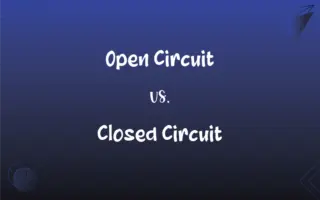Conceptual vs. Perceptual: What's the Difference?
Edited by Aimie Carlson || By Janet White || Published on December 29, 2023
Conceptual refers to ideas and abstract concepts, while perceptual relates to the way one perceives through the senses.

Key Differences
Conceptual involves abstract thinking and the formation of ideas independent of sensory experience. Perceptual, in contrast, is rooted in sensory experiences and how one perceives the world through the senses.
Conceptual thinking is about understanding and processing ideas, often in a theoretical or abstract manner. Perceptual experiences are about interpreting sensory information, such as sight, sound, and touch.
In the realm of conceptual, ideas and theories are developed and pondered. In the perceptual domain, it's about the immediate sensory experiences and their interpretation.
The conceptual focuses on the mental constructs that help in understanding the world, often in a generalized way. Perceptual deals with the direct, immediate sensory input and the individual's response to it.
Conceptual understanding shapes how we think about the world and formulate ideas. Perceptual understanding is about how we directly experience and make sense of our surroundings.
ADVERTISEMENT
Comparison Chart
Basis
Abstract ideas and theories
Sensory experiences and perception
Focus
Mental constructs and understanding
Direct sensory input and interpretation
Nature
Theoretical, abstract
Concrete, based on senses
Role in Cognition
Formulating and processing ideas
Interpreting and responding to sensory data
Relationship with Reality
Generalized, often detached from direct experience
Direct, immediate experience of reality
ADVERTISEMENT
Conceptual and Perceptual Definitions
Conceptual
Related to the formation of ideas or theories.
The conceptual framework of her thesis was well-developed.
Perceptual
Concerned with the interpretation of sensory data.
Perceptual illusions can trick the mind into seeing things differently.
Conceptual
Based on abstract reasoning.
Conceptual art often challenges traditional notions of art.
Perceptual
Involving the recognition and interpretation of sensory stimuli.
Artists often have a keen perceptual awareness of their surroundings.
Conceptual
Involving the use of concepts or the ability to conceptualize.
His conceptual skills are vital for solving complex problems.
Perceptual
Relating to the process of perceiving through the senses.
The perceptual experience of color varies from person to person.
Conceptual
Pertaining to concepts or mental abstraction.
His conceptual understanding of physics is impressive.
Perceptual
Referring to the way sensory information is organized and understood.
Perceptual learning involves adapting to new sensory environments.
Conceptual
Related to the mental representation of ideas.
The conceptual model helped simplify the complex data.
Perceptual
Based on sensory experience and observation.
The perceptual differences between the two images were subtle.
Conceptual
Of or relating to concepts or mental conception
Conceptual discussions that antedated development of the new product.
Perceptual
Of, based on, or involving perception.
Conceptual
Of or relating to conceptualism.
Perceptual
Relating to perception.
Conceptual
Of, or relating to concepts or mental conception.
We defined a conceptual model before designing the real thing.
Perceptual
Of or relating to the act of perceiving;
Perceptual stimulus
Conceptual
Of or relating to conceptualism.
Conceptual
Pertaining to conception.
Conceptual
Being or characterized by concepts or their formation;
Conceptual discussions
The schizophrenic loses ability to abstract or do conceptual thinking
FAQs
Are conceptual skills important in problem-solving?
Yes, they are crucial for abstract reasoning and idea formulation.
Can perceptual skills be improved?
Yes, through practice and exposure to varied sensory experiences.
Is conceptual thinking always abstract?
Generally, it is abstract, dealing with ideas rather than concrete experiences.
How does perceptual understanding work?
It works through the interpretation of sensory data.
Do perceptual experiences vary among individuals?
Yes, perceptual experiences can vary significantly from person to person.
What is the focus of conceptual thinking?
Conceptual thinking focuses on abstract ideas and theories.
Is perception only about sight?
No, it involves all senses, including hearing, touch, taste, and smell.
Can conceptual ideas be proven?
They can be supported by evidence or logical reasoning, but are often theoretical.
Are perceptual abilities innate?
Some are innate, but many can be developed or refined over time.
Does culture affect perceptual experiences?
Yes, cultural background can influence how we perceive and interpret sensory information.
Are there careers that require strong conceptual skills?
Yes, careers in fields like philosophy, mathematics, and strategic planning require strong conceptual skills.
Can conceptual thinking be applied to practical situations?
Yes, it can be applied to devise solutions or understand complex scenarios.
How does conceptual knowledge influence perception?
It can shape the way we interpret and understand sensory information.
Is perceptual learning a part of educational curricula?
It can be, especially in fields like art, design, and sensory studies.
Can conceptual understanding lead to innovation?
Yes, it often drives innovation and new approaches to problems.
Can conceptual thinking be subjective?
Yes, it can be influenced by personal beliefs and experiences.
Are conceptual frameworks used in scientific research?
Yes, they are fundamental in forming hypotheses and theories.
How do perceptual illusions work?
They trick the brain into perceiving something differently than it actually is.
Is perceptual accuracy always reliable?
Not always, as it can be affected by factors like context and previous experiences.
Do perceptual skills decline with age?
Some perceptual abilities can decline, but others can be maintained or improved.
About Author
Written by
Janet WhiteJanet White has been an esteemed writer and blogger for Difference Wiki. Holding a Master's degree in Science and Medical Journalism from the prestigious Boston University, she has consistently demonstrated her expertise and passion for her field. When she's not immersed in her work, Janet relishes her time exercising, delving into a good book, and cherishing moments with friends and family.
Edited by
Aimie CarlsonAimie Carlson, holding a master's degree in English literature, is a fervent English language enthusiast. She lends her writing talents to Difference Wiki, a prominent website that specializes in comparisons, offering readers insightful analyses that both captivate and inform.






































































